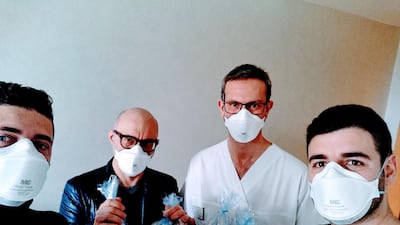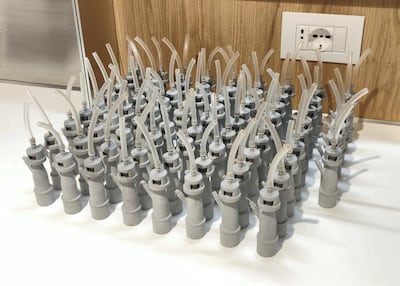As the coronavirus pandemic continues to disrupt global supply chains and cause a shortage of medical equipment, 3D printing technology is helping an Italian hospital meet a scarcity of valves used in ventilators.
The technology is being developed by an Italian digital start-up, Isinnova, in collaboration with local entrepreneur Massimo Temporelli.
"We came to know that the hospital was urgently looking for valves and there was a shortage in supply, we immediately got in touch with the staff and started the work," Cristian Fracassi, founder of Isinnova, told The National.
The company, which employs 14 people, first printed a few prototypes of the valves that were successfully tested by the medical staff at Chiari hospital in Brescia, a city in the northern region of Lombardy – one of the areas hardest hit by the virus.
Isinnova has so far printed more than 100 valves – weighing only 20 grams each – and supplied them to the hospital free of charge.
Made of plastic, these valves connect oxygen masks to ventilators used by coronavirus patients. They are called Venturi valves, named after 18th-century Italian physicist Giovanni Battista Venturi.
“We are not charging for these valves. This is our gesture to give back to the society,” said Mr Fracassi.
Italy is struggling with the worst outbreak of coronavirus outside China. More than 2,500 people have died out of the 31,500 and more who have contracted the disease.
"Ten patients are accompanied by a 3D-printed valve machine [at Chiari hospital]," wrote Mr Temporelli, who is based out of Milan, on his Facebook wall.
“We have to give a big round of applause to Cristian Fracassi who with his team designed and printed 3D the missing piece ... all at the speed of light,” said Mr Temporelli, who was the first to approach Isinnova.
Paola Pisano, Italy’s Minister for Innovation and Digitalisation, took to Twitter to praise this breakthrough.
"Congratulations to Cristian Fracassi and all the people who helped him in the task of 3D printing the missing valves for the respirators of the Chiari Hospital in Brescia," she tweeted.
Although the case for replacing industrial manufacturing on a wider scale with 3D printing is unproven, ratings agency Moody’s said the technology has great potential in many sectors.
Industries such as aerospace, medical devices, eyewear and automotive will benefit from this technology which rapidly builds a three-dimensional object that can be customised cheaply using a computer-aided design model, Moody's said in a report released in August last year.



